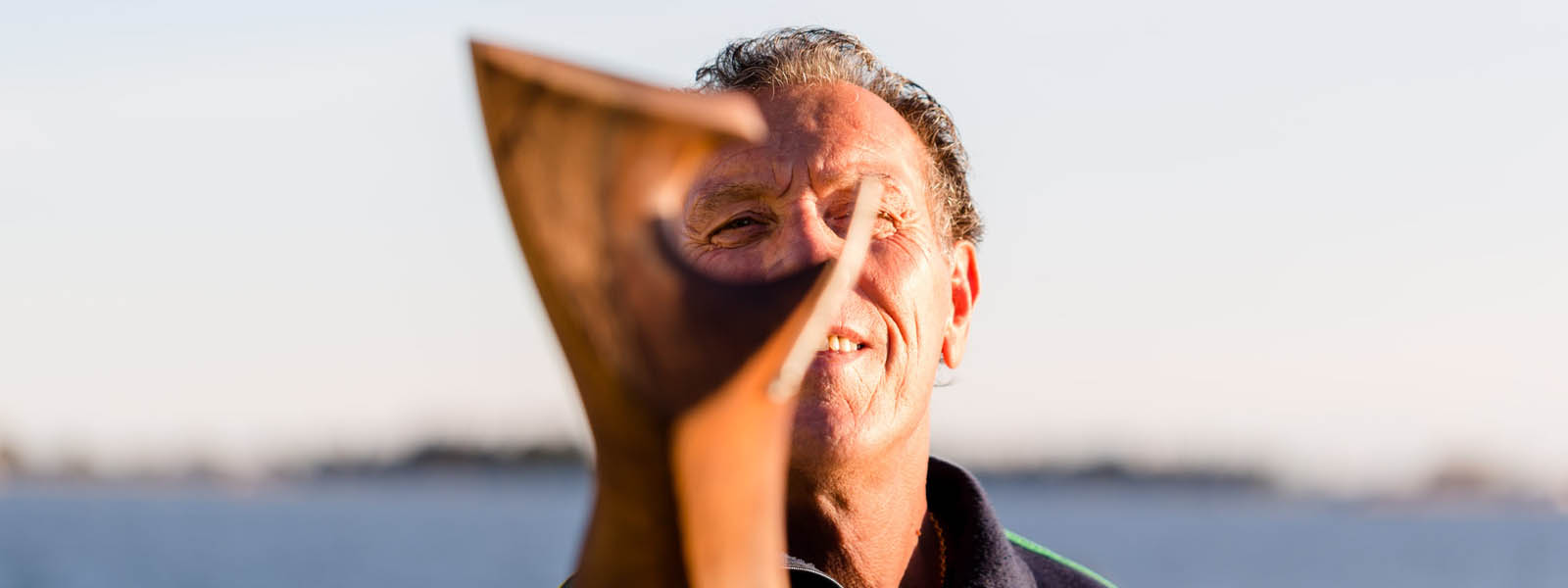WHAT’S IT LIKE TO LIVE ON BURANO?
Living on Burano is a unique experience. I worked for 40 years in Venice and I always commuted between Burano and Venice, which was really lovely. The 45-minute trip wasn’t a drag; it was really nice. You talked with your friends and saw the sun rise every morning. You got to work with a happy heart. And then there was the happiness of going home. Burano is great place to live, it’s laidback and we all know each other, like one big family.HOW DID YOU START ROWING?
I started when I was 48 or 49 – when everyone else stopped, I started. Because I made some mistakes in life (he laughs). I started off playing checkers, and I was good at it: I was the Italian champion in the nationals for two straight years. But then I began rowing because I had gained weight I weighed more than 230 pounds I’m six feet tall and I have high blood pressure. When I went to the doctor he told me I had to take pills. I asked him for how long, and he said for the rest of my life.HOW DID YOU RESPOND?
I don’t like taking medication, so I stopped and asked myself, what am I missing? I was relatively sedentary at work since I worked in an office, then I went home and played checkers, so I was only exercising my brain, not my body. I said to myself, I have to do something. I never liked diets because I found them sad, and I tried running but I could never get into it.AND SO YOU STARTED ROWING
I joined the Burano Rowing Association and I entered a new world. One day I went there expecting someone to call me, but no one did. I went and watched the others rowing, and I always stayed on shore. But when I was little, I went rowing with my father every so often. So I started asking if I could go out alone, and they said I could. Within a year I had lost more than 40 pounds, without taking medication, and eating and enjoying myself.SO YOU CHANGED YOUR LIFE
I changed if for the better. I started rowing, rowing, rowing. I’m a person who always strives for perfection in everything I do. I came from playing checkers and my work was also very meticulous. As I trained I became really good, and I became a rowing champion.AND THEN YOU STARTED WINNING
After a few years. When I was around 50 I started winning my first races. Then they had me row the Caorline, which are very heavy boats – about 1000 pounds – and there are six of you. You become part of a group of all for one, one for all. You suffer and learn together, because rowing trains you work hard, it’s just hard work. With the beginner group we won four consecutive races. Then I won in my category, the Valesine, for four straight years in San Marco, when a bunch of different associations competed in one day.AND THEN YOU GOT TO THE REGATTA STORICA DI VENEZIA
The regatta storica is something very unique, I get emotional when I talk about it. It always takes me back. I first started with my beginner-level friends, we said to each other, “We have a good boat, we can do it!” because the selections are very strict. You can be disqualified like that. We said, “Come on, we’ve been rowing all summer, we’re prepared!” I remember that it was a Tuesday and the registration period ended Thursday. We met right in front of this bar at 10 at night. We made an appointment to go together to register. There were six of us and we looked at one another and laughed because we were short one person. A guy who was a champion but who didn’t row anymore passed by and we said to him, “Giovanni, would you be our seventh?” and he said, “Yes, but I don’t row.” We were ultimately accepted and had boat number 5, the red one.THE COMPETITION MUST HAVE BEEN OVERWHELMING
That day I said to my teammates, “Being here, we’ve already won, whatever comes next, we just have to enjoy ourselves.” The best part is that when you enter the Grand Canal, you see this huge crowd cheering you on, and they don’t just cheer for who comes first, but for everyone. I remember that we were last and everyone was clapping and yelling, “Bravi, bravi! The others are all on steroids! You guys are amazing.” And that was the first experience, we finished and we were happy. The year after I was called to race at Treporti with a group of amateurs. We came in fourth.
But there was always this question in the back of my mind, when you enter the Grand Canal and you see the winners’ podium and every time you pass it you say, “When am I ever going to win” because only the first three boats stop there, the rest have to keep going. But then I thought, “Come on, at my age, yeah, right.”
BUT THEN, IN 2010
In 2010 we had another amateur team but we were so prepared and as I said before, all for one and one for all, and it’s the chemistry of the group that makes the difference. Until the day before the race we were short one person, the person who who stays at the stern. During practice a different guys always came, but every time that person would say, “You guys are too strong, I can’t do it.” At the time we tried nine different people. The last one was a champion who said, “I’ll come try you guys out.” We registered and we saw that the boat was really going, we were finally in the right situation. We got off to a good start; we were second. On the way back another boat passed us and we were third. I remember that we only had 100 meters left to go, another boat was about to pass us, and we said, “Third is okay but fourth, no way,” and I said to the guy in front me, “Clench your teeth, clench your teeth!” I remember that when he turned around he had a tooth missing, he had swallowed it! As soon as we arrived, one of my teammates threw himself down on the stern because he was seeing stars. But finally, we got to the podium and got our prize. For me, that was the best part, the best.THEN YOU KEPT GOING
Yes, I did eight regattas in all. And always with good results: the year after we were with some young guys who were just starting out and we arrived fifth. I could have continued after eight but I had a problem with my eye, I had a detached retina and so in 2013 I stopped. I did it again the year after, because they call me and tell me I’m the “glue” that keeps the group together, and that makes me very proud.

